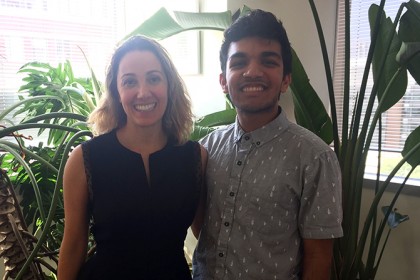"The politics of the outbreak were worse than the virus itself," said Dr. Pardis Sabeti, one of the prominent leaders of the of the 2014 Ebola outbreak response in West Africa and one of the most inspiring people I have ever had the privilege of meeting.

Image caption: Rushabh Doshi (right) with Pardis Sabeti
Image credit: Rushabh Doshi
"Wait … what?" I thought to myself.
This was the beginning of my first conversation with Sabeti, who I conducted research with during a summer internship at the Broad Institute in Cambridge, Massachusetts.
Leading up to the internship, I read extensively about Ebola transmission and how the virus had mutated, thus creating the grounds for an outbreak of this size. I made sure to prepare myself for any biological-based question including mechanisms, physiology, and everything in between. I read case reports tracing back to the 20th century and made myself familiar with the science behind Ebola.
Little did I know that all of this preparation would leave me ill-suited for the discussion following Sabeti's initial statement to me. And as I joined her efforts in writing a book regarding the outbreak response of the Ebola virus, I couldn't help but question it.
How can politics be worse than the virus itself?
As I began looking at the hundreds of responses submitted by outbreak respondents for a survey sent out by Sabeti Labs, I finally understood what Sabeti was talking about. This small but significant realization led me to have one of the most impactful summers of my life.
Outbreak response culture is a place of hope and despair. It's a place where respondents go in and build local capacity to help natives, educate locals about the virus, and create safe environments to prevent the outbreak from spreading. It's also a place where people can take advantage of outbreak resources, spread fake news to scare locals, and act as "war dogs"—or in this case "outbreak dogs."
While working on research regarding Zika, malaria, chikungunya, and other mosquito-borne viruses, I kept on coming back to this book that went against everything that was said about the outbreak. The Ebola outbreak was one the most publicized outbreaks in history, and for good reason. Yet it's interesting to see how despite the non-stop outbreak coverage, there was a failure to cover the politics behind the outbreak. After all, the Ebola outbreak was identified as a public health emergency by the World Health Organization far too late. Stakeholders took constant advantage of their peers, leading to a disruptive environment in such trying times.
The opportunity to help analyze data from multiple stakeholders allowed us to create a list of recommendations that we believe will help keep politics out of outbreak response. In times like these, it is crucial to put aside politics and do everything in our power to save as many people as we can.
About the author
Rushabh Doshi is a member of the Johns Hopkins Class of 2018 and a public health major. Rushabh is spending the summer as a research associate for Sabeti Labs at the Eli and Edythe L. Broad Institute of MIT and Harvard.
Have a story to share as part of the Hub's Summer Gigs series? Email Taylor Jade Powell to pitch your idea.
Posted in Student Life
Tagged internships










